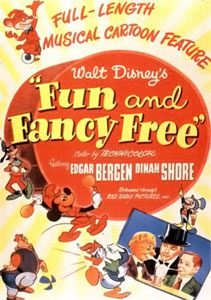 “If you have seen one old Disney package movie,” complained a member of my house, “you have seen them all.” This is not true, but lackluster present advertising makes it look that way. If we compare the animation, writing, and innovation in these package films to movies like Minions or Kung Fu Panda, then it is true that each Disney film contains more genuine artistry, wit, and development in one segment than any of those terrible films combined.
“If you have seen one old Disney package movie,” complained a member of my house, “you have seen them all.” This is not true, but lackluster present advertising makes it look that way. If we compare the animation, writing, and innovation in these package films to movies like Minions or Kung Fu Panda, then it is true that each Disney film contains more genuine artistry, wit, and development in one segment than any of those terrible films combined.
There are also bad segments. Walt and his company were trying to survive following a war where animators were drafted and the studio was run by the government. They made it, but barely. They turned to jollity and Mickey to save the studio.
If you fought World War II only to be betrayed by Uncle Joe and his murderous Bolsheviks, being full of fun and fancy free for an hour or so must have seemed like an excellent idea. The world was worried and the Cricket conscience of Disney’s imagination reminded us that doomsayers were nothing new. Doom is coming, to something, somewhere, soon, but in God’s good time, somebody, somewhere, soon is also having a party. We should keep both in mind and muddle along. If it is foolish to always be fun and fancy free, it is worse to always be dour and imagination free.
What was Walt teaching us?
There is a time for Dinah Shore and a time for Tchaikovsky and coming home from World War II made it a good time for Dinah Shore. Certain sincere people never have time for the circus because the cares of this age produce a Santorum like earnestness in them at all times. No matter how hard you fight, the moment you take a break and have some fun and fancy free, the earnest will pour a glass of prune juice and remind you of forty-five problems you are ignoring. “How can you have a party when. . . ” could always stop a feast this side of Paradise.
If we were God, and by the grace of God we are not God, then we might be justified in this attitude. Blessedly, we are not God and so not called to solve all the world’s problems while growing unfit to live in Paradise. Since there are no wrongs to right in the Heavenly City, the man who reduces himself to a culture warrior will be unhappy in the New Jerusalem where the culture is just right.
Being “fun and fancy free” can only be a holiday in this life, but a holiday is good. Love is part of that holiday, but love demands a battle and acclimating to liberty. In Bongo’s case, this comes with a literal opponent and in reverse City Mouse/Country Mouse, Walt shows that the urban Bongo has mad skills: unicycle skills, hat wearing skills, boxing skills. Bongo, the first short, reminds us that a holiday must end, we might complain about work, but work is good for us. So even in Fun and Fancy Free, Walt and his team are not predictable.
A set of disturbing puppets introduces the second part of the feature, though the insults of Charlie McCartney still work, the sequence is harmed by the fact that contemporary viewers do not know Bergan, not even Candice. Walt gives irony a rest following the ironic introduction of the puppets: cynicism is followed by an old fashioned fairy tale which might be a allegory of California. Loss of the magic harp turns Happy Valley into Dry Gulch.
Magic has been stolen and only Donald and Mickey can bring it back. Jerry Brown might take notes: selling California for a magic train is even more foolish than magic beans. The train isn’t innovative or imaginative enough unless we have returned to the nineteenth century. We need seeds for the imagination . . . the beans that will help Goofy, Donald, and Mickey rescue the magic harp. Walt had something right: World War II had stripped innocence and magic out of the world. It was hard to be happy when you had seen what the GI’s saw. Civilians had to deal with the horrors of concentration camps revealed and a great cause that had not created paradise. We went from World War II to Korea and the Cold War with hardly a stop for a parade.
Poverty and horror are the foes of music and imagination. Walt and company tried to provide a moment, a brief interlude, where we could return to the pre-War world, with characters popular before the War that had gone through the War with us, and rescue Happy Valley. Can this work? Perhaps, because merely the possibility of something more, even the smallest break that suggests what was, need not be what will be, is helpful. The gentleness, pacing, and creativity of Fun and Fancy Free were a respite from a reality too gruesome to be born with sanity. Pixar does the same task for us today with better funding.
The next time someone says you are “wasting time” with an imaginative bit of play . . . or laughing with Mickey and at Goofy while straining to understand Donald . . . tell them you are planting the seeds for a restoration of happiness to your part of the world.











